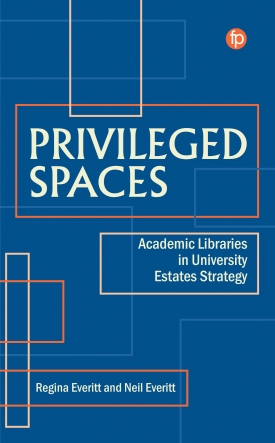
Primary tabs
You don't need to be an ALA Member to purchase from the ALA Store, but you'll be asked to create an online account/profile during checkout to proceed. This Web Account is for both Members and non-Members. Note that your ALA Member discount will be applied at the final step of the checkout process.
If you are Tax-Exempt, please verify that your account is currently set up as exempt before placing your order, as our new fulfillment center will need current documentation. Learn how to verify here.
- Description
- Table of Contents
- About the authors
Library staff and leaders in particular will gain practical intelligence to advocating for library spaces after reading this book.
Privileged Spaces draws on the knowledge and experience of library leaders, estates directors, space managers, and researchers to examine how the demands on library space change due to evolving university estates strategy. It highlights the impact this can have on space retention, service delivery and user satisfaction, demonstrating the importance of library, estates and facilities leaders working in partnership to deliver spaces in alignment with university planning.
As universities continually change their strategy and teaching spaces to meet market demands, library spaces are increasingly in scope for estates development plans in the same way as any university building. Drawing on years of professional experience, the authors provide guidance on fostering an effective working relationship with a range of university departments, making the case for investment in libraries, engaging stakeholders to support library development, and influencing university estates strategy. This book features case studies to illustrate the successes and challenges of delivering small to large library space projects. This is an ideal reference for library directors, staff, and planning professionals who want to ensure their library space meets the needs of its users and the wider university.
Introduction: A Meeting of the Founders of Library Science and Facilities Management - Regina Everitt and Neil Everitt
Part 1 Foundations
1. Estates and Facilities with Libraries: Working Together to Deliver University Strategy - Lucy Black and Robert Kilpatrick
2. Academic Libraries and Estates Strategy: A Library Leadership Perspective - Tim Wales
3. The University Library as Estates Asset: Tools for Negotiating Space in an Evolving Strategy - Regina Everitt
4. A Practical Guide to Writing a Successful Business Case to Influence University Estates Strategy - Anna O'Neill
5. 'Selling' the University: The Role of the Academic Library - Regina Everitt
6. The Library through a Workplace Lens: A Conversation with Neil Everitt
Part 2 Landings
7. Repurposing Library Study Space to Create a Family Study Room: A Case Study at University of Bradford - Alison Lahlafi
8. Politics, Persuasion and Persistence: The Learning Commons Project at the University of Galway - John Cox
9. The University of Northampton Waterside Campus - Becky Bradshaw and Chris Powis
10. Social and Informal Learning Spaces and Inclusion - Andrew Cox, Melanie Benson Marshall, Jenny Burnham, Leo Care, Chris Clow, Savannah Hanson, Tim Herrick, Myles Jones and Alison Little
Conclusion: The Privilege of Working in Partnership - Regina Everitt
Index
Regina Everitt
Regina Everitt is Assistant Chief Operating Officer (ACOO) & Director of Library, Archives and Learning Services at the University of East London. She began her professional career as a technical author/trainer working with computer companies that developed software for the manufacturing, pharmaceutical and financial sectors in the US and UK. After managing a small library at a university in West Africa as a volunteer with the United States Peace Corps, she transitioned into the HE sector developing and managing libraries, social learning spaces, and other learning resources. Concerned about the low representation of Global Ethnic Majority (GEM) staff members in leadership positions in academic libraries, she co-project managed SCONUL research to document GEM staff experiences in library and information sciences (LIS) and is working with the sector to implement the recommendations from the report to develop more diverse talent. She is a member of the SCONUL Board, the British Library Advisory Council, and a member of a CILIP trailblazer group that is developing a standard for a Level 6/7 apprenticeship.
Neil Everitt
Neil Everitt is Director of Strategic Engagement at the Institute of Workplace and Facilities Management (IWFM). Before joining IWFM he developed an interest in property after completing a volunteer procurement project for a charity providing community-based services in London. Prior to that he fulfilled numerous sales and marketing, and procurement and change management roles, in several countries, with a large multi-national mining organization.


